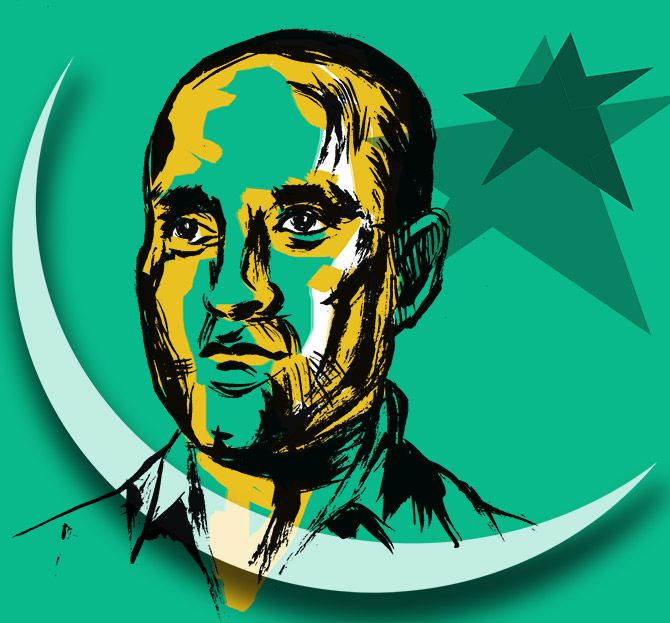'The Modi government will be wasting its time talking to Nawaz Sharif.'
'It would be better if it were to open a direct channel with the Pakistan army,' says Rajeev Sharma.
Illustration: Dominic Xavier/Rediff.com

The death sentence for former Indian Navy officer Kulbhushan Jadhav in an alleged espionage case by a Pakistan military kangaroo court is a signature case of the modus operandi of the powerful Pakistan army which traditionally keeps the civilian government out of the loop.
It shows that the Pakistani military establishment cares two hoots for the elected government in office.
It proves yet again what the world knows: That in other countries the State has an army but in Pakistan the army has got a State.
It's also a signal of things to come in the India-Pakistan bilateral context as the timing of Jadhav's death sentence is hugely important.
The development comes close on the heels of the two sides holding talks under the rubric of the Indus River Waters Commission and an Indian parliamentary delegation just concluding a visit to Pakistan -- both events decidedly a forward-looking step.
More importantly, the development comes just about ten days before the two countries' Coast Guard were to hold talks in New Delhi. Now this event is as good as cancelled because it is highly unlikely that the Modi government will go ahead with these talks after this extreme provocation.
The latest turn in the Jadhav saga points to many more important things in diverse areas:
- The Nawaz Sharif government as well as Pakistan's national assembly have been systematically shut out of the Jadhav case. Pakistani parliamentary committees on defence and foreign affairs have zilch information on the alleged espionage episode.
- Sartaj Aziz, the Pakistan prime minister's foreign affairs advisor, told the Pakistan senate in December that the civilian government had no evidence of Jadhav being an Indian spy.
Thus, the Pakistani military's kangaroo court has wilfully and blatantly gone contrary to what a top official like Sartaj Aziz told the Pakistan parliament on record.
It reconfirms the Pakistan army's 'My way or highway' approach.
It also confirms that when it comes to Pakistan's civilian government trying to smoke the peace pipe it is the Pakistan army which is actually the super government.
Pakistan's government proposes; Pakistan's army disposes! - While Jadhav was ensnared from Iran last year -- though the Pakistan army wants the world to believe he was arrested in its Balochistan province -- during the then army chief General Raheel Sharif's tenure, his death sentence has been confirmed by current army chief General Qamar Javed Bajwa.
It shows that the Jadhav case is being choreographed solely by the Pakistan army.
All this indicates that the Modi government will be wasting its time and effort negotiating peace with the Nawaz Sharif government.
It would be better off if it were to open a direct channel with the Pakistan army. India's National Security Advisor Ajit Doval clearly has his task cut out in this regard.
Perhaps most importantly, the Jadhav case may well be linked to a retired Pakistani army officer's disappearance.
Lieutenant Colonel Mohammed Habib went missing from Lumbini in Nepal close to the Indian border a few days ago. The Pakistani media is awash with inspired stories that Habib has been 'kidnapped' by the Research and Analysis Wing, India's external intelligence agency.
There is a possibility that the haste shown by the Pakistani military court in sentencing Jadhav to death may be a pre-emptive move to tell its domestic constituency that the military establishment made the first move and the Indian action (of 'kidnapping' Habib) is a retaliatory action.
Pakistan is back on the front burner of the Indian strategic establishment. The Jadhav case will have a loud echo in India-Pakistan bilateral diplomacy.
Rajeev Sharma, an independent journalist and strategic analyst, tweets @Kishkindha
MUST READ features on the KULBHUSHAN JADHAV case in the RELATED LINKS below...









